3 - Witnesses
Summary
One of the defining characteristics of fictional responses to the Rwanda genocide is a concern with documenting and remembering the truth about what happened in 1994. The importance of accurately describing the horrors of the genocide is summarized in the quotation from German playwright Peter Weiss that Rurangwa chooses as the epigraph for his novel, Au sortir de l'enfer:
Pendant longtemps on a dit tout cela indicible. Nous arrivons au point où il faut décrire de façon la plus précise ce qui reste incompréhensible
[For a long time all of that was said to be unspeakable. We are now getting to the point where what is still incomprehensible needs to be described as precisely as possible]
In order to convincingly tell a story that has been repeatedly described as unspeakable, untellable, incomprehensible, unknowable, authors rely on witness accounts from Rwandans who were present in 1994; real–life stories that have been passed on to them or those they have experienced first–hand. Bearing witness about the genocide requires remarkable courage, strength and determination. It is therefore not always easy to find primary witnesses who are willing to give testimony. Many witnesses are already dead, in exile or in prison. This explains the search for witnesses that runs through many of the genocide novels and is particularly strongly felt in Ndwaniye's La Promesse faite à ma soeur. Having returned to his Belgian home after searching for the truth about what happened in Rwanda, the narrator writes:
Je pensais souvent à ces témoins que j'avais eu beau chercher dans les rues de Kigali sans pouvoir les trouver. […] Ils n’étaient plus là! Ils n'étaient plus! J'aurais voulu qu'ils m'expliquent pourquoi pendant mon absence notre pays s'est basculé dans l'horreur. (199)
[I often thought about those witnesses I had looked for in vain in the streets of Kigali without ever finding them. […] They were no longer there! They were no more! I would have liked them to explain to me why, during my absence, our country let itself fall into horror]
Most of the people who witnessed the horror are now dead.
- Type
- Chapter
- Information
- Rwanda Genocide StoriesFiction After 1994, pp. 80 - 108Publisher: Liverpool University PressPrint publication year: 2015



